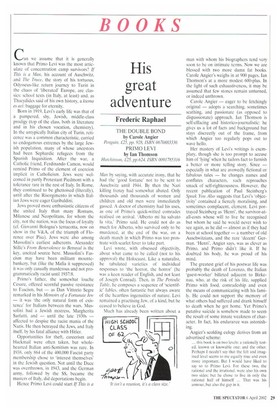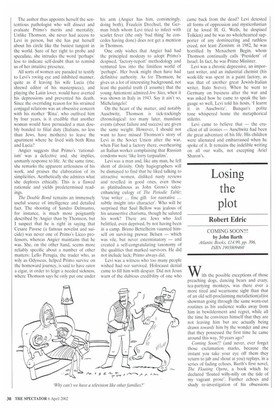His great adventure
Frederic Raphael
THE DOUBLE BOND by Carole Angier Penguin, £25, pp. 928, ISBN 0670883336 PRIMO LEVI by Ian Thomson Hutchinson, £25, pp.624, ISBN 0091785316 Can we assume that it is generally known that Primo Levi was the most articulate of concentration camp survivors? If This is a Man, his account of Auschwitz, and The Truce, the story of his tortuous, Odysseus-like return journey to Turin in the chaos of 'liberated' Europe, are classics: school texts (in Italy, at least) and, as Thucydides said of his own history, a ktema es aei: baggage for eternity.
Born in 1919, Levi's early life was that of a pampered, shy, Jewish, middle-class prodigy (top of the class, both in literature and in his chosen vocation, chemistry). In the untypically Italian city of Turin, reticence was a common characteristic, carried to endogamous extremes by the large Jewish population. many of whose ancestors had been Sephardic refugees from the Spanish Inquisition. After the war, a Catholic friend, Ferdinand° Camon, would remind Primo of the element of coercion implicit in Catholicism. Jews were welcomed in partly Protestant Piedmont with a tolerance rare in the rest of Italy. In Rome. they continued to be ghettoised (literally), until after the Risorgimento in which Italian Jews were eager Garibaldini.
Jews proved more enthusiastic citizens of the united Italy than many Romans. Milanese and Neopolitans, for whom the city, not the nation, was the focus of loyalty (cf. Giovanni Bologna's terracotta, now on show in the V&A, of the triumph of Florence over Pisa). Jews were also among Mussolini's earliest adherents. Alexander Stille's From Benevolence to Betrayal is the key, uncited source here. Mussolini's Fascism may have been militant mountebankery, but (like the Mafia it suppressed) it was only casually murderous and not programmatically racist until 1937/8.
Primo's father, the somewhat louche Cesare, offered scornful passive resistance to Fascism, but — as Dan Vittorio Segre remarked in his Memoirs of a Fortunate Jew — it was 'the only natural form of existence' for Italians between the wars. Mussolini had a Jewish mistress, Margherita Sarfatti, and — until the late 1930s — affected to despise the racist mania of the Nazis. He then betrayed the Jews, and Italy itself, by his fatal alliance with Hitler.
Opportunities for theft, careerism and blackmail were often taken, but wholehearted Italian anti-Semitism was rare. In 1938, only 864 of the 400,000 Fascist party membership chose to 'interest themselves' in the Jewish question. Not until the Duce was overthrown, in 1943, and the German army, followed by the SS, became the masters of Italy, did deportations begin.
Hence Primo Levi could start If This is a Man by saying, with accurate irony, that he had the 'good fortune' not to be sent to Auschwitz until 1944. By then the Nazi killing frenzy had somewhat abated. Only thousands and thousands of women and children and old men were immediately gassed. A doctor of chemistry had his uses, as one of Primo's quick-witted comrades realised on arrival. 'Alberto ml ha salvato la vita,' Primo said. He could not do as much for Alberto, who survived only to be murdered, at the end of the war, on a death march in which Primo was too prostrate with scarlet fever to take part.
Levi wrote, with obsessed objectivity, about what came to be called (not to his approval) the Holocaust. Like a naturalist, he tabulated varieties of individual responses to 'the horror, the horror' (he was a keen reader of English, and not least of Joseph Conrad). Then. in The Periodic Table, he composes a sequence of 'scientific' fables, often fantastic but always aware of the heartless ingenuities of nature. Levi remained a practising Jew, of a kind, but he ceased to believe in God.
Much has already been written about a man with whom his biographers tend very soon to be on intimate terms. Now we are blessed with two more damn fat books. Carole Angier's weighs in at 900 pages, Ian Thomson's at a more modest 600-plus. In the light of such exhaustiveness, it may be assumed that few stones remain unturned, or indeed unthrown.
Carole Angier — eager to be fetchingly original — adopts a searching, sometimes scathing, and passionate (as opposed to dispassionate) approach. Ian Thomson is self-effacing and historico-journalistic: he gives us a lot of facts and background but stays discreetly out of the frame, from which Angier too regularly pops out to wave hello.
Her mastery of Levi's writings is exemplary, though she is too prompt to accuse him of 'lying' when he tailors fact to furnish a better or more telling story. Since — especially in what are avowedly fictional or fabulous tales — he changes names and conflates characters, such reproaches smack of self-righteousness. However, the recent publication of Paul Steinberg's Speak You Also suggests that Levi's 'objectivity' contained a fiercely moralising, and sometimes complacent, element. Levi portrayed Steinberg as 'Henri', the survivor-atall-costs whose will to live he recognised but whom he said he would never wish to see again, as he did — almost as if they had been at school together — a number of old Auschwitzians, and the rare 'decent' German. 'Henri', Angier says, was as clever as Primo. and Primo didn't like it. If he doubted his body, he was proud of his mind.
The greatest grief of his postwar life was probably the death of Lorenzo, the Italian 'guest-worker' billeted adjacent to Birkenau, who, at the risk of his life, supplied Primo with food, comradeship and even the means of communicating with his family. He could not support the memory of what others had suffered and drank himself to death when he got home. Yet Primo's putative suicide is somehow made to seem the result of some innate weakness of character. In fact, his endurance was astonishing.
Angler's scolding eulogy derives from an advertised scheme:
... this book is on two levels: a rationally tested, known or knowable one; and the other. Perhaps I needn't say that the felt and imagined level seems to me equally true and even more important. But I would have liked to say so to Primo Levi. For these two, the rational and the irrational, were also his own two sides: but he chose to live in only the rational half of himself ... That was his armour, but also the gap in it.
The author thus appoints herself the sententious pathologist who will dissect and evaluate Primo's merits and mentality. Unlike Thomson, she never had access to Levi in person, but she has put herself about his circle like the busiest tangent in the world. Sure of her right to probe and speculate, she intrudes the word 'perhaps' less to indicate self-doubt than to remind us of her intuitive presence.
All sorts of women are paraded to testify to Levi's roving eye and inhibited manner, quite as if leaving his wife Lucia (the shrewd editor of his masterpiece), and playing the Latin lover, would have averted his depressions and prevented his death. Since the overriding reason for his strained conjugal relations was an obsessive concern with his mother 'Rind, who outlived him by four years, is it credible that another woman would have persuaded a man doubly bonded to filial duty (Italians, no less than Jews, have mothers) to leave the apartment where he lived with both Rina and Lucia?
Angier suggests that Primo's 'rationalism' was a defective and, she implies, unmanly response to life. At the same time, she remarks the apparent artlessness of his work, and praises the elaboration of its simplicities. Aesthetically she admires what she deplores ethically. This is a flawed rationale and yields predetermined readings.
The Double Bond remains an immensely useful source of intelligence and detailed fact. The shooting of Sandro Delmastro, for instance, is much more poignantly described by Angier than by Thomson, but I suspect that he is right in saying that Cesare Pavese (a famous novelist and suicide) was never one of Primo's Liceo professors, whereas Angier maintains that he was. She, on the other hand, seems more reliably specific about a number of other matters: LeHo Perugia, the trader who, as wily as Odysseus, helped Primo survive on the homeward journey, is said to have eaten a cigar, in order to feign a needed sickness, where Thomson says he only put one under his arm (Angier has him, convincingly, doing both). Fraulein Drechsel, the German bitch whom Levi tried to infect with scarlet fever (the only 'bad thing' he concedes having done) does not get a mention in Thomson.
One only wishes that Angier had had the principled modesty to adopt Primo's despised, 'factory-report' methodology and ventured less into the limitless world of 'perhaps'. Her book might then have had definitive authority. As for Thomson, he gives us a lot of interesting background, not least the painful truth (I assume) that the young Anton ioni admired Jew Sass, when it was shown in Italy in 1943. Say it ain't so, Michelangelo!
On the heart of the matter, and notably Auschwitz, Thomson is tick-tockingly chronological: too many later, mundane events (about failure and success) are given the same weight. However, I should not want to have missed Thorrison's story of Levi in the Soviet Union after the war, when Fiat had a factory there, overhearing an Italian worker complaining that Russian condoms were 'like lorry tarpaulins'.
Levi was a man and, like any man, he fell short of divinity. Only hagiographers will be dismayed to find that he liked talking to attractive women, disliked nasty reviews and revelled in good ones, even those as platitudinous as John Gross's salesenhancing eulogy of The Periodic Table: 'true writer ... fine gift for narrative ... subtle insight into character'. Who will be surprised that Saul Bellow was jealous of his unassertive charisma, though he saluted his work? There are Jews who feel belittled, even deprived, by not having been in a camp. Bruno Bettelheim vaunted himself on surviving prewar Belsen — which was vile, but never exterminatory — and created a self-congratulating taxonomy of the qualities that marked survivors. He did not include luck; Primo always did.
Levi was a witness who too many people wished had not survived. Holocaust denial came to fill him with despair. Did not Jesus warn of the dubious credibility of one who came back from the dead? Levi detested all forms of oppression and mysticofustian (if he loved H. G. Wells, he despised Tolkien) and he was no wholehearted supporter of any domineering and ruthless creed, not least Zionism: in 1982, he was horrified by Menachem Begin, whom Thomson continually calls 'President' of Israel. In fact, he was Prime Minister.
Levi was a chronic depressive, an important writer, and an industrial chemist (his work-life was spent in a paint factory, as was that of another great Jewish-Italian writer, Italo Svevo), When he went to Germany on business after the war and was asked how he came to speak the language so well, Levi told his hosts, 'I learnt it in Auschwitz'. Banquo's polite tone whispered home the metaphorical stiletto.
Levi came to believe that — the cruellest of all ironies — Auschwitz had been the great adventure of his life. His children were alienated and embarrassed when he spoke of it. It remains the indelible writing on all our walls, not excepting Aridl Sharon's.































































 Previous page
Previous page